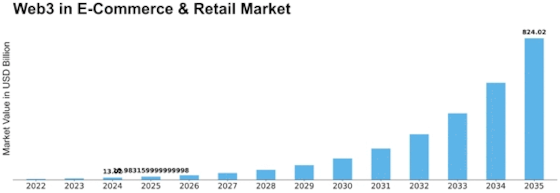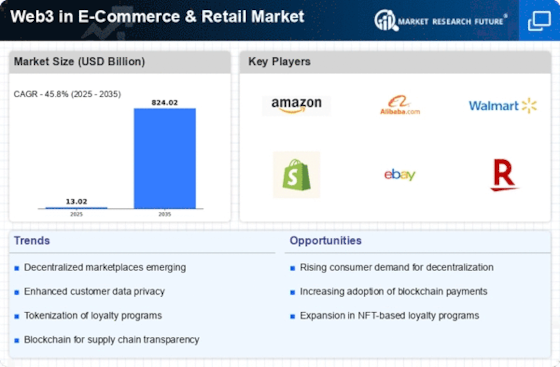-
Executive summary
-
Market Introduction
-
Definition
-
Scope of the Study
- Research Objective
- Assumptions
- Limitations
-
Research Methodology
-
Overview
-
Data Mining
-
Secondary Research
-
Primary Research
- Primary Interviews and Information Gathering Process
- Breakdown of Primary Respondents
-
Forecasting Modality
-
Market Size Estimation
- Bottom-Up Approach
- Top-Down Approach
-
Data Triangulation
-
Validation
-
Market Dynamics
-
Overview
-
Drivers
-
Restraints
-
Opportunities
-
Market Factor Analysis
-
Value Chain Analysis
-
Porter’s Five Forces Analysis
- Bargaining Power of Suppliers
- Bargaining Power of Buyers
- Threat of New Entrants
- Threat of Substitutes
- Intensity of Rivalry
-
COVID-19 Impact Analysis
- Market Impact Analysis
- Regional Impact
- Opportunity and Threat Analysis
-
GLOBAL Web3 in E-Commerce & Retail Market, BY TYPE
-
Overview
-
Public
-
Private
-
Consortium
-
Hybrid
-
GLOBAL Web3 in E-Commerce & Retail Market, BY Application
-
Overview
-
Cryptocurrency
-
Conversational AI
-
Data & Transaction Storage
-
Payments
-
Smart Contracts
-
Others
-
GLOBAL Web3 in E-Commerce & Retail Market, by Region
-
Overview
-
North America
- U.S.
- Canada
-
Europe
- Germany
- France
- U.K
- Italy
- Spain
- Rest of Europe
-
Asia-Pacific
- China
- India
- Japan
- South Korea
- Australia
- Rest of Asia-Pacific
-
Rest of the World
- Middle East
- Africa
- Latin America
-
Competitive Landscape
-
Overview
-
Competitive Analysis
-
Market Share Analysis
-
Major Growth Strategy in the Global Web3 in E-Commerce & Retail Market,
-
Competitive Benchmarking
-
Leading Players in Terms of Number of Developments in the Global Web3 in E-Commerce & Retail Market,
-
Key developments and Growth Strategies
- New TYPE Launch/Application Deployment
- Merger & Acquisitions
- Joint Ventures
-
Major Players Financial Matrix
- Sales & Operating Income, 2022
- Major Players R&D Expenditure. 2022
-
Company ProfileS
-
Brunswick Corporation
- Company Overview
- Financial Overview
- Products Offered
- Key Developments
- SWOT Analysis
- Key Strategies
-
Filecoin
- Company Overview
- Financial Overview
- Products Offered
- Key Developments
- SWOT Analysis
- Key Strategies
-
Helium Systems Inc
- Company Overview
- Financial Overview
- Products Offered
- Key Developments
- SWOT Analysis
- Key Strategies
-
Kadena LLC
- Company Overview
- Financial Overview
- Products Offered
- Key Developments
- SWOT Analysis
- Key Strategies
-
Kusama
- Company Overview
- Financial Overview
- Products Offered
- Key Developments
- SWOT Analysis
- Key Strategies
-
Livepeer Inc
- Company Overview
- Financial Overview
- Products Offered
- Key Developments
- SWOT Analysis
- Key Strategies
-
Ocean Protocol Foundation Ltd
- Company Overview
- Financial Overview
- Products Offered
- Key Developments
- SWOT Analysis
- Key Strategies
-
Polygon Technology
- Company Overview
- Financial Overview
- Products Offered
- Key Developments
- SWOT Analysis
- Key Strategies
-
Web3 Foundation
- Company Overview
- Financial Overview
- Products Offered
- Key Developments
- SWOT Analysis
- Key Strategies
-
Zel Technologies Limited
- Company Overview
- Financial Overview
- Products Offered
- Key Developments
- SWOT Analysis
- Key Strategies
-
Appendix
-
References
-
Related Reports
-
LIST OF TABLES
-
Global Web3 in E-Commerce & Retail Market, Synopsis, 2018-2032
-
Global Web3 in E-Commerce & Retail Market, Estimates & Forecast, 2018-2032 (USD BILLION)
-
GLOBAL Web3 in E-Commerce & Retail Market, BY TYPE, 2018-2032 (USD BILLION)
-
GLOBAL Web3 in E-Commerce & Retail Market, BY APPLICATION, 2018-2032 (USD BILLION)
-
North America Web3 in E-Commerce & Retail Market, BY TYPE, 2018-2032 (USD BILLION)
-
North America Web3 in E-Commerce & Retail Market, BY APPLICATION, 2018-2032 (USD BILLION)
-
North America Web3 in E-Commerce & Retail Market, BY Country, 2018-2032 (USD BILLION)
-
U.S. Web3 in E-Commerce & Retail Market, BY TYPE, 2018-2032 (USD BILLION)
-
U.S. Web3 in E-Commerce & Retail Market, BY APPLICATION, 2018-2032 (USD BILLION)
-
Canada Web3 in E-Commerce & Retail Market, BY TYPE, 2018-2032 (USD BILLION)
-
Canada Web3 in E-Commerce & Retail Market, BY APPLICATION, 2018-2032 (USD BILLION)
-
Europe Web3 in E-Commerce & Retail Market, BY TYPE, 2018-2032 (USD BILLION)
-
Europe Web3 in E-Commerce & Retail Market, BY APPLICATION, 2018-2032 (USD BILLION)
-
Europe Web3 in E-Commerce & Retail Market, BY Country, 2018-2032 (USD BILLION)
-
Germany Web3 in E-Commerce & Retail Market, BY TYPE, 2018-2032 (USD BILLION)
-
Germany Web3 in E-Commerce & Retail Market, BY APPLICATION, 2018-2032 (USD BILLION)
-
France Web3 in E-Commerce & Retail Market, BY TYPE, 2018-2032 (USD BILLION)
-
France Web3 in E-Commerce & Retail Market, BY APPLICATION, 2018-2032 (USD BILLION)
-
Italy Web3 in E-Commerce & Retail Market, BY TYPE, 2018-2032 (USD BILLION)
-
Italy Web3 in E-Commerce & Retail Market, BY APPLICATION, 2018-2032 (USD BILLION)
-
Spain Web3 in E-Commerce & Retail Market, BY TYPE, 2018-2032 (USD BILLION)
-
Spain Web3 in E-Commerce & Retail Market, BY APPLICATION, 2018-2032 (USD BILLION)
-
U.K Web3 in E-Commerce & Retail Market, BY TYPE, 2018-2032 (USD BILLION)
-
U.K Web3 in E-Commerce & Retail Market, BY APPLICATION, 2018-2032 (USD BILLION)
-
Rest of Europe Web3 in E-Commerce & Retail Market, BY TYPE, 2018-2032 (USD BILLION)
-
Rest of Europe Web3 in E-Commerce & Retail Market, BY APPLICATION, 2018-2032 (USD BILLION)
-
Asia Pacific Web3 in E-Commerce & Retail Market, BY TYPE, 2018-2032 (USD BILLION)
-
Asia Pacific Web3 in E-Commerce & Retail Market, BY APPLICATION, 2018-2032 (USD BILLION)
-
Asia Pacific Web3 in E-Commerce & Retail Market, BY Country, 2018-2032 (USD BILLION)
-
Japan Web3 in E-Commerce & Retail Market, BY TYPE, 2018-2032 (USD BILLION)
-
Japan Web3 in E-Commerce & Retail Market, BY APPLICATION, 2018-2032 (USD BILLION)
-
China Web3 in E-Commerce & Retail Market, BY TYPE, 2018-2032 (USD BILLION)
-
China Web3 in E-Commerce & Retail Market, BY APPLICATION, 2018-2032 (USD BILLION)
-
India Web3 in E-Commerce & Retail Market, BY TYPE, 2018-2032 (USD BILLION)
-
India Web3 in E-Commerce & Retail Market, BY APPLICATION, 2018-2032 (USD BILLION)
-
Australia Web3 in E-Commerce & Retail Market, BY TYPE, 2018-2032 (USD BILLION)
-
Australia Web3 in E-Commerce & Retail Market, BY APPLICATION, 2018-2032 (USD BILLION)
-
south korea Web3 in E-Commerce & Retail Market, BY TYPE, 2018-2032 (USD BILLION)
-
south korea Web3 in E-Commerce & Retail Market, BY APPLICATION, 2018-2032 (USD BILLION)
-
Rest of asia-pacific Web3 in E-Commerce & Retail Market, BY TYPE, 2018-2032 (USD BILLION)
-
Rest of asia-pacific Web3 in E-Commerce & Retail Market, BY APPLICATION, 2018-2032 (USD BILLION)
-
Rest of WOrld Web3 in E-Commerce & Retail Market, BY TYPE, 2018-2032 (USD BILLION)
-
Rest of WOrld Web3 in E-Commerce & Retail Market, BY APPLICATION, 2018-2032 (USD BILLION)
-
Rest of WOrld Web3 in E-Commerce & Retail Market, BY Country, 2018-2032 (USD BILLION)
-
Middle east Web3 in E-Commerce & Retail Market, BY TYPE, 2018-2032 (USD BILLION)
-
Middle east Web3 in E-Commerce & Retail Market, BY APPLICATION, 2018-2032 (USD BILLION)
-
Africa Web3 in E-Commerce & Retail Market, BY TYPE, 2018-2032 (USD BILLION)
-
Africa Web3 in E-Commerce & Retail Market, BY APPLICATION, 2018-2032 (USD BILLION)
-
Latin america Web3 in E-Commerce & Retail Market, BY TYPE, 2018-2032 (USD BILLION)
-
Latin america Web3 in E-Commerce & Retail Market, BY APPLICATION, 2018-2032 (USD BILLION)
-
LIST OF FIGURES
-
Research Process
-
Market Structure for the Global Web3 in E-Commerce & Retail Market
-
Market Dynamics for the Global Web3 in E-Commerce & Retail Market
-
Global Web3 in E-Commerce & Retail Market, Share (%), BY TYPE, 2022
-
Global Web3 in E-Commerce & Retail Market, Share (%), BY APPLICATION, 2022
-
Global Web3 in E-Commerce & Retail Market, Share (%), by Region, 2022
-
north AMERICA: Web3 in E-Commerce & Retail Market, SHARE (%), BY REGION, 2022
-
Europe: Web3 in E-Commerce & Retail Market, SHARE (%), BY REGION, 2022
-
Asia-Pacific: Web3 in E-Commerce & Retail Market, SHARE (%), BY REGION, 2022
-
Rest of the world: Web3 in E-Commerce & Retail Market, SHARE (%), BY REGION, 2022
-
Global Web3 in E-Commerce & Retail Market: Company Share Analysis, 2022 (%)
-
Brunswick Corporation : FINANCIAL OVERVIEW SNAPSHOT
-
Brunswick Corporation : SWOT ANALYSIS
-
Filecoin : FINANCIAL OVERVIEW SNAPSHOT
-
Filecoin : SWOT ANALYSIS
-
Helium Systems Inc : FINANCIAL OVERVIEW SNAPSHOT
-
Helium Systems Inc : SWOT ANALYSIS
-
Kadena LLC : FINANCIAL OVERVIEW SNAPSHOT
-
Kadena LLC : SWOT ANALYSIS
-
Kusama : FINANCIAL OVERVIEW SNAPSHOT
-
Kusama : SWOT ANALYSIS
-
Livepeer Inc : FINANCIAL OVERVIEW SNAPSHOT
-
Livepeer Inc : SWOT ANALYSIS
-
Ocean Protocol Foundation Ltd : FINANCIAL OVERVIEW SNAPSHOT
-
Ocean Protocol Foundation Ltd : SWOT ANALYSIS
-
Polygon Technology : FINANCIAL OVERVIEW SNAPSHOT
-
Polygon Technology : SWOT ANALYSIS
-
Web3 Foundation : FINANCIAL OVERVIEW SNAPSHOT
-
Web3 Foundation : SWOT ANALYSIS
-
Zel Technologies Limited : FINANCIAL OVERVIEW SNAPSHOT
-
Zel Technologies Limited: SWOT ANALYSIS



















Leave a Comment